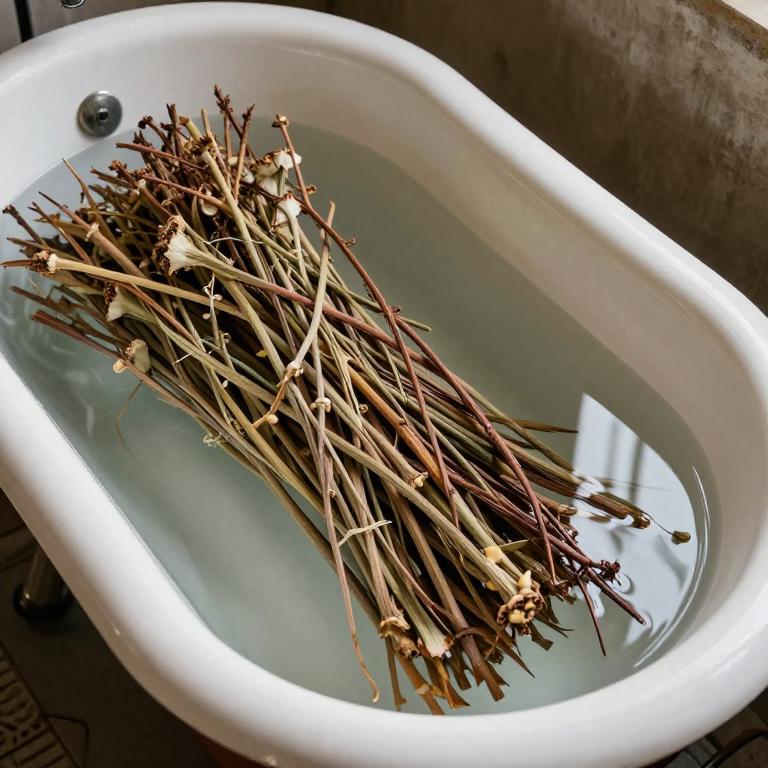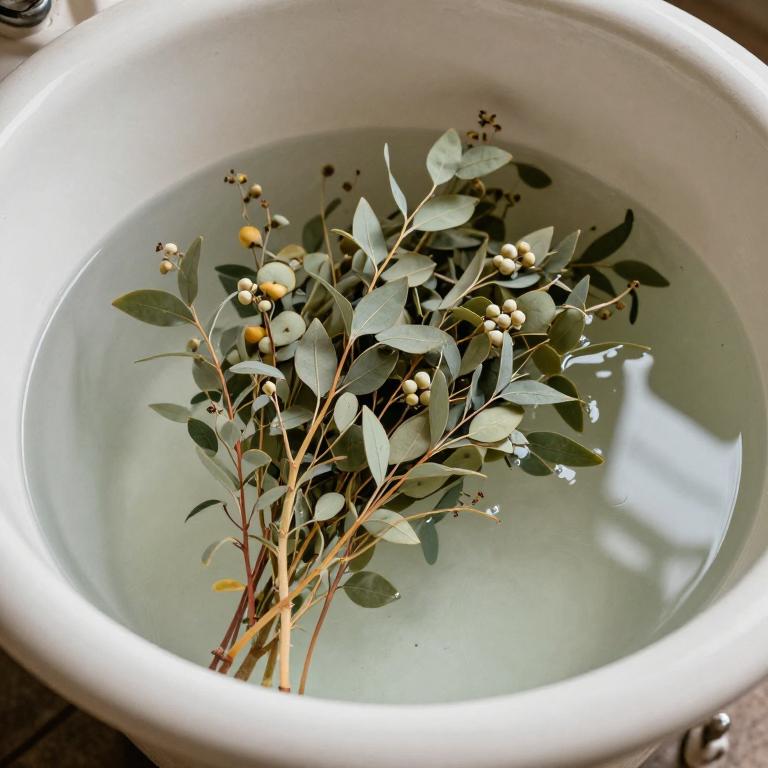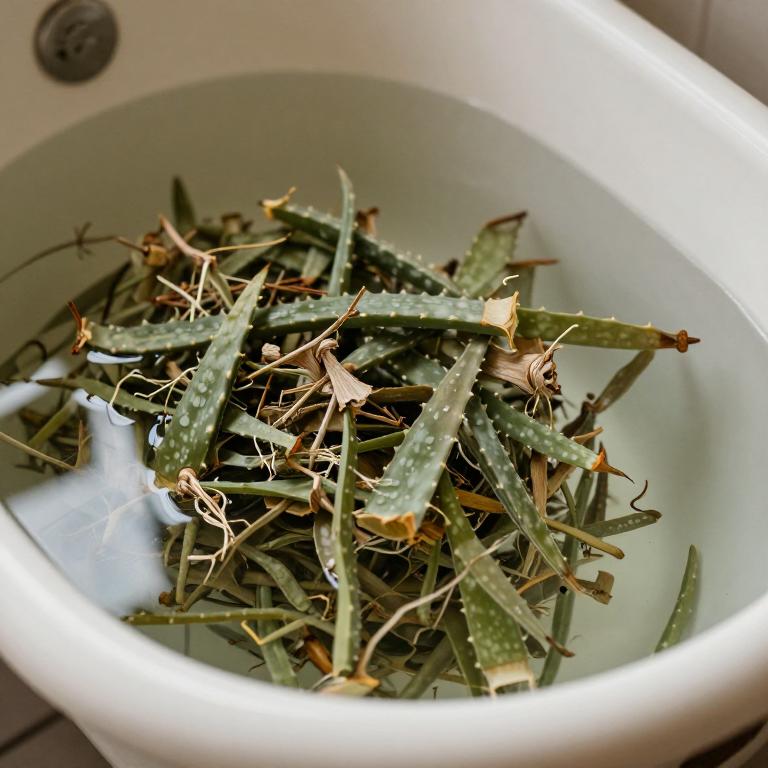10 Best Herbal Baths For Oily Hair

Herbal baths for oily hair involve using natural ingredients like neem, aloe vera, and fenugreek to cleanse and balance the scalp.
These herbs are known for their antimicrobial and anti-inflammatory properties, which help reduce excess oil production and prevent dandruff. To prepare an herbal bath, you can steep the dried herbs in hot water and use the infusion to rinse your hair after shampooing. This method not only detoxifies the scalp but also nourishes the hair without adding extra grease.
Regular use of herbal baths can promote a healthier scalp environment and lead to shinier, more manageable hair over time.
Table of Contents
- 1. Rosemary (Rosmarinus officinalis)
- 2. English lavender (Lavandula angustifolia)
- 3. Stinging nettle (Urtica dioica)
- 4. Lemon grass (Cymbopogon citratus)
- 5. Salvia (Salvia officinalis)
- 6. Melaleuca (Melaleuca alternifolia)
- 7. St. john's wort (Hypericum perforatum)
- 8. Field horsetail (Equisetum arvense)
- 9. Aloe vera (Aloe barbadensis)
- 10. Yarrow (Achillea millefolium)
1. Rosemary (Rosmarinus officinalis)

Rosmarinus officinalis, commonly known as rosemary, is a fragrant herb that has been traditionally used for its therapeutic properties, including its ability to benefit oily hair when incorporated into herbal baths.
When used in a bath, rosemary leaves release essential oils that can help balance scalp oil production and improve circulation to the scalp. The antibacterial and antifungal properties of rosemary may also help reduce dandruff and other scalp issues often associated with oily hair. To use rosemary in a herbal bath, fresh or dried leaves can be steeped in hot water and then added to a tub, allowing the steam to infuse the hair and scalp.
This natural remedy offers a gentle, aromatic way to cleanse and revitalize oily hair while promoting a healthier scalp environment.
2. English lavender (Lavandula angustifolia)

Lavandula angustifolia, commonly known as English lavender, is often used in herbal baths for its soothing and cleansing properties.
When infused into bath water, lavender can help balance scalp oils and reduce excess sebum production, making it beneficial for those with oily hair. Its mild antiseptic and anti-inflammatory qualities may help soothe irritation and promote a healthier scalp environment. The calming aroma of lavender also contributes to a relaxing bath experience, which can reduce stress and indirectly support hair health.
Regular use of lavender-infused baths can be a natural and gentle way to maintain scalp hygiene and manage oily hair without harsh chemicals.
3. Stinging nettle (Urtica dioica)

Urtica dioica, commonly known as stinging nettle, is a powerful herb that can be used in herbal baths for oily hair due to its ability to cleanse and balance scalp health.
When used in a bath, the leaves of stinging nettle release compounds that help remove excess oil and impurities from the scalp and hair. The natural astringent properties of nettle can help shrink oil glands, reducing overall sebum production. To prepare a nettle bath, fresh or dried leaves can be steeped in hot water and then used as a rinse or added directly to the bathwater.
Regular use of urtica dioica herbal baths can promote a healthier scalp environment and improve the overall texture and appearance of oily hair.
4. Lemon grass (Cymbopogon citratus)

Cymbopogon citratus, commonly known as lemongrass, is a popular herbal ingredient used in natural hair care routines, particularly for those with oily hair.
When infused into bath water, lemongrass helps to balance scalp oils and promote a refreshed, clean feeling without stripping the hair of its natural moisture. Its essential oils have antimicrobial properties that can help reduce dandruff and prevent scalp infections, which are often associated with oily hair. The refreshing citrus scent of lemongrass also provides a calming and invigorating experience during a bath.
Regular use of lemongrass herbal baths can contribute to healthier hair by regulating sebum production and improving overall scalp hygiene.
5. Salvia (Salvia officinalis)

Salvia officinalis, commonly known as sage, has been traditionally used in herbal baths for its soothing and cleansing properties, particularly for those with oily hair.
When infused into bath water, sage helps to balance scalp oils and promote a healthier scalp environment by reducing excess sebum production. Its antimicrobial and anti-inflammatory properties can also help prevent scalp infections and reduce dandruff, making it a natural alternative to commercial shampoos. To use sage in a bath, simply steep dried sage leaves in hot water for several hours, then add the infused liquid to your bathwater.
Regular use of sage-infused baths can lead to shinier, healthier hair and a more refreshed feeling without the need for harsh chemical treatments.
6. Melaleuca (Melaleuca alternifolia)

Melaleuca alternifolia, commonly known as tea tree oil, is often used in herbal baths for oily hair due to its natural antimicrobial and anti-inflammatory properties.
When added to bath water, tea tree oil can help reduce excess sebum production and soothe scalp irritation, making it beneficial for those with oily hair types. The essential oil has a refreshing scent and can be easily diluted with water or a carrier oil to create a soothing bath experience. Regular use of tea tree oil in baths may help maintain a balanced scalp environment and promote healthier hair growth.
However, it is important to ensure proper dilution to avoid skin irritation and to consult with a healthcare professional if any adverse reactions occur.
7. St. john's wort (Hypericum perforatum)

Hypericum perforatum, commonly known as St. John's Wort, is often used in herbal baths for oily hair due to its natural antiseptic and anti-inflammatory properties.
When added to bathwater, it can help regulate sebum production, reducing excess oiliness without stripping the hair of its natural moisture. The calming aroma of hypericum perforatum also promotes relaxation and can soothe the scalp, making it beneficial for those with sensitive or irritated skin. To use it for oily hair, a few drops of a hypericum-infused oil or a diluted herbal infusion can be added to the bathwater.
Regular use of hypericum perforatum baths may help maintain a balanced scalp environment and improve overall hair health.
8. Field horsetail (Equisetum arvense)

Equisetum arvense, commonly known as field horsetail, is a traditional herbal remedy that has been used for centuries to create beneficial herbal baths for oily hair.
This plant is rich in silica, which helps to strengthen hair shafts and improve overall scalp health. When used in a bath, equisetum arvense can help to cleanse the scalp by balancing oil production and removing excess sebum. Its astringent properties also help to tighten pores and reduce dandruff, making it ideal for those with oily or congested scalps.
Incorporating equisetum arvense into a regular bathing routine can promote healthier, more manageable hair over time.
9. Aloe vera (Aloe barbadensis)

Aloe barbadensis, commonly known as aloe vera, is a natural remedy that can be beneficial for those with oily hair when used in herbal baths.
Its gel contains soothing properties that help to calm the scalp and reduce excess oil production. When incorporated into a hair bath, aloe vera can help balance the scalp's natural oils and promote a healthier hair environment. It also has antimicrobial properties that may help prevent scalp infections and dandruff.
For best results, aloe vera can be mixed with water or a mild shampoo and applied to the hair and scalp before rinsing, offering a natural and effective alternative to commercial products.
10. Yarrow (Achillea millefolium)

Achillea millefolium, commonly known as yarrow, is a herb that has been traditionally used for its soothing and cleansing properties, making it a valuable ingredient in herbal baths for oily hair.
When used in a bath, yarrow can help to balance sebum production, reduce excess oiliness, and promote a healthier scalp environment. The herb contains antimicrobial and anti-inflammatory compounds that may help to combat scalp infections and irritation often associated with oily hair. To prepare an herbal bath, steep dried yarrow flowers in hot water, allow it to cool, and then use the infused water to rinse the hair and scalp after shampooing.
Regular use of yarrow-based baths can contribute to long-term scalp health and reduce the frequency of oily hair concerns.